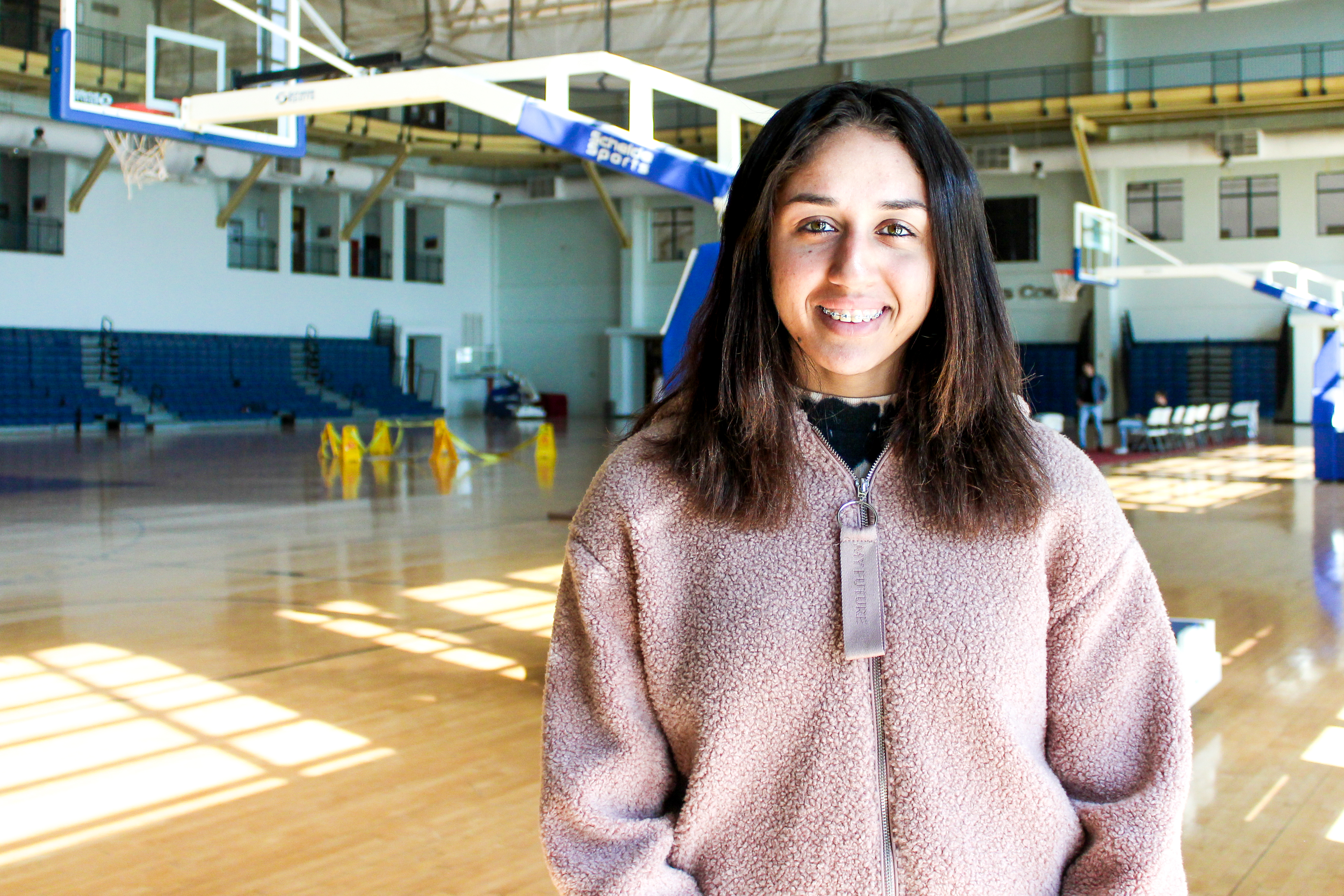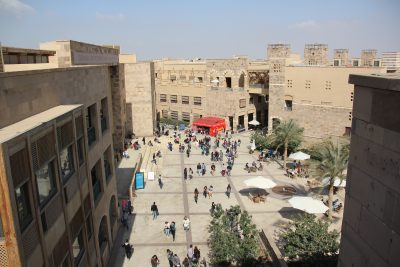Anderson: Free Expression is Absolutely Essential
BY SARAH EL SAFTY

However, AUC’s policies currently in place to govern matters such as speeches, protests and the posting of flyers have undergone major changes since 2011.
“It started a month before the revolution when Lisa Anderson first took her term as president,” said Assistant Director for Student Conduct Salma El Shayeb.
“One of the first decisions that she made was creating this freedom of expression policy.”Anderson, AUC’s current president, told the Caravan that she champions freedom of expression on the basis of learning from one’s mistakes.“I have long believed that the most important human right – and certainly the most important right at a university – is what I call ‘the right to be wrong,’” she said.
She explained that the essence of learning is delving into unknown territory and hence being more able to making mistakes and building one’s understanding based on these mistakes.
“A university is, above all, a place for learning. So free expression – the right to hold and express ideas that are unconventional, unorthodox, indeed, perhaps wrong – is absolutely essential to the mission of a university,” Anderson added.
PRE-2011 POLICY
According to El Shayeb, the policy on freedom of expression contained more guidelines prior to Anderson beginning her time as president.
Before Anderson amended the policy, strikes and sit-ins were allowed only if students took the permission of a member of the Office of Student Development (OSD) 48 hours in advance of the planned event.
“A lot of students would like to have sit-ins and it used to be organized; there were no problems and we never said no, provided that it did not stall the operations and it did not disrupt classes,” said OSD Acting Director Dalia Issa.
El Shayeb also said that students were never forbidden from expressing their opinions but that the administration often employed “informal” means of monitoring.
However, some student expression reportedly faced hurdles during this time.
In one incident during the fall 2010 semester, an issue of the AUC Times was stalled because it included an interview with Abdel Moneim Aboul Fotouh, who was a prominent member of the Muslim Brotherhood (MB) at the time.
According to Ahmed Morsy, the editor-in-chief of the AUC Times at the time of this incident, the article was initially not approved by the OSD because articles with political content required approval from an academic advisor.
“As one of the on-campus student publications, we were required to submit the articles to one of the OSD staff [members] for review before going to the print shop,” Morsy said.
“When that staff member found out about the interview with Aboul Fotouh, I was told that the OSD director must take a look at the interview before approving it.”
Issa said that the issue was stalled because the magazine did not have a faculty advisor, although all news publications at AUC require one.
She added that the interview with Aboul Fotouh was a matter of concern because the MB’s activities were not considered “favorable” by a lot of people during that time.
However, Morsy said that even after Amani Ismail, assistant professor at the Department of Journalism and Mass Communication, became AUC Times’ faculty advisor and approved the interview, the issue did not immediately move forward.
“The OSD director [Mohamed Dabbour] still didn’t approve the issue and said he got in touch with then- Provost Lisa Anderson and that we must wait until she responds,” Morsy said.
As Anderson was unavailable at the time, Morsy instead sought approval from then-Vice President of Student Affairs Ashraf El Fiqi who allowed the issue to go to print.
Morsy said that he had been so persistent in getting the issue approved by the administration because the magazine’s team was far from siding with any political group.
“I think the stance that we took and refusing to give in to pressures was very important and it was the reason we got our right to publish the interview,” he added.
POST-2011 POLICY
According to the editors-in-chief who succeeded Morsy, the AUC Times did not face the same challenges after the aforementioned incident.
Adham Youssef, the spring 2014 editor-in-chief, said that they frequently published controversial articles without being censored.
“Although some professors didn’t agree with our content, they encouraged us to address our ideological framework and our agenda,” he said.
Youssef added that he and the high board members presented their vision to the OSD and their faculty advisors, none of whom had objections.
AUC Times’ current Editor-in- Chief Hazem El Essawy echoed Youssef’s thoughts on the matter.
“No one tried to interfere in the content of the magazine. Most of the academic advisor’s remarks are technical and aim to ensure consistently high quality and journalistic professionalism,” El Essawy said.
He added that he does not know if this lack of censorship is because AUC provides an environment where freedom of expression is protected or if the magazine simply has yet to introduce content that is controversial enough to call for censorship.
Other modes of expression, such as distributing printed material, offering petitions for signature and delivering speeches outside university buildings are allowed without prior approval.
However, according to the current policy, protests and demonstrations are permitted but require prior notification.
El Shayeb said that this change came at a time when the whole community in Egypt had a strong urge to express its opinions – and the students at AUC were no exception.
The Speaker’s Corner was created around that time to facilitate the process of expression for AUC community members.
Described as a place where the “Tahrir spirit will be preserved”, the corner was open to “anyone, regarding any topic, with any form of expression be it: stand- up comedies, monologues, dialogue, debates, discussions, music playing, art”, according to its Facebook page.
RESULTING COMPLICATIONS
Although many community members hailed the changes to the policy, some problems have occurred as a result of the liberties provided.
According to the policy, an event should not infringe upon the rights or privileges of anyone not in sympathy with it and no one will be permitted to harm others, damage or deface property, block access to university buildings or disrupt classes.
When a strike against increasing fees in 2012 culminated in the closure of the university gates, the administration and students alike were placed in a difficult position.
El Shayeb said that the problem with the gate closure was that it prevented people from doing their jobs or whatever else they needed to do on campus.
“In a sense, it was [a violation]; however, with the masses because the students were many, the university responded with these negotiations because it was so big and [continued to grow],” El Shayeb added.
Issa said that there have been incidents other than the gate closure where students abused the freedom of expression policy, recalling a student who once heckled a professor during a speech and accused him of being an infiltrator.
“One of the students came up and started shouting at him and in the end we found out it was because he gave him a D in a course,” Issa said.
AUC AND CONTROVERSY
The AUC community’s ability to freely express itself is not restricted to on- campus activities, however; several controversial Facebook pages such as “AUC Atheists” and “AUC LGBTQ+” have been created in the recent past.
“It’s an exciting time to be in Egypt because the country has been opening up and social media has been allowing students and allowing people to express their views,” said Dean of Students Jennifer Skaggs.
Both Facebook pages have received much attention since their creation, with some community members voicing their support and others lauding them.
“Although…we often hear ideas we think are completely wrong-headed, as long as we have a right to say that we think so without intimidation or harassment, I think we are all better off for the opportunities to learn that this right affords,” said Anderson.
Regardless of the support they have each garnered, however, it is highly unlikely that either of them will move their activity from the Internet and materialize on campus.
“According to the mandate of the university, we don’t establish clubs based on religious, political or sexual matters,” Issa said, “Nothing that includes segregation or discrimination.”
Skaggs also said that the university does not deal with “things that are anonymous” because “there is a personal responsibility and authority in owning one’s views.
The “AUC Atheists” and “AUC LGBTQ+” page administrators were unavailable for comment.
ACADEMIC FREEDOM OF EXPRESSION
As for academic freedom of expression, AUC has sometimes faced difficulties when it comes to liberties in the classroom.
Samia Mehrez, director of AUC’s center for translation studies recalled in her book Egypt’s Culture Wars: Politics and Practice an incident that occurred in 1998 where a novel she taught in a class was banned by AUC after parents complained that it contained “pornographic” material.
AUC faced criticism locally and internationally as a result of the incident.
Skaggs said that these incidents happen all over the world but that she personally would warn students beforehand to avoid such issues.
She also added that even though critical thinking is paramount in classrooms, it gets “really messy” if a student starts questioning some of those things.
“As a faculty member I think it’s our responsibility to work with those questions and to talk about them and not to suppress them but that also might mean you might not get done all the points of your lecture,” she added.
Skaggs said that AUC is moving forward in terms of freedom of expression and hopes that the community will soon be able to achieve an understanding and respect of all different points of view.



